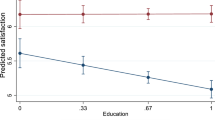Abstract
Previous research has found a positive relationship between having voted for a party that is part of the government and satisfaction with democracy. However, no research has examined this relationship in the specific case of a two-round system. Relying on original panel data survey conducted before and after the 2012 legislative election in France, this article addresses the question of how vote choices in the first and second rounds affect satisfaction with democracy. We find that both rounds have a similar impact and that voters who rallied a winning party in the second round are as happy with the democratic process as early supporters.
Similar content being viewed by others
Notes
To be fair, this is nothing surprising as the TRS is used to elect both the President and the lower house of Duverger’s native France.
The other parties accounted for in the analysis are: UMP, Front National (FN), Front de Gauche (FdG), MoDem, Nouveau Parti Anticapitaliste (NPA), Lutte Ouvrière (LO) and Nouveau Centre (NC). The few respondents who voted for other parties (N=48 in the first round and N=52 in the second round) are excluded as we cannot tell whether their vote was sincere or not. Note that among these other parties there was the Parti radical de gauche (PRG), which obtained 2 per cent of the votes and had two ministers in the cabinet. Unfortunately, we are unable to distinguish those who voted for that party.
The mean was weighted by the proportion of portfolios hold by each party at the time of the second wave panel. Seventeen government members were from the PS and one from EELV.
If one includes abstainers, the official results are the following: 16.5 per cent of voters voted for PS and 3.1 per cent for EELV in the first round; in the second round, 21.8 per cent of voters voted for PS and 1.9 per cent for EELV; abstention was of 42.8 per cent at the first round and of 44.6 per cent at the second round.
EELV had a candidate in the presidential elections, Eva Joly, but she gathered only 2.3 per cent of the vote share and did not qualify for the second round.
It is important to note that this result is not an artifact of the ideological bloc identification. Among respondents who voted for a non-winning left-wing parties at the first round (that is, FdG or NPA, N=70), those who rallied a winning party at the second round are more satisfied than those who did not. The average change in satisfaction with democracy after the election (compared with before) among those who voted for a winning party (N=47) is +0.5, while it is 0.0 among those who abstained or voted for a losing party (N=23). The sample is, however, too small for this difference to be statistically significant.
One exception to this situation is when a minor party concludes an electoral alliance with a major party, as it was the case for EELV (and PRG) and PS in the 2012 legislative elections. In these elections, EELV obtained 66 districts (out of 577) without a PS candidate. In this case, the odds for an EELV candidate to get qualified for the second round were much higher.
References
Anderson, C.J., Blais, A., Bowler, S., Todd, D. and Listhaug, O. (2005) Losers’ Consent: Elections and Democratic Legitimacy. New York: Oxford University Press.
Anderson, C.J. and Guillory, C.A. (1997) Political institutions and satisfaction with democracy: A cross-national analysis of consensus and majoritarian systems. American Political Science Review 91 (1): 66–81.
Anderson, C.J. and LoTempio, A.J. (2002) Winning, losing and political trust in America. British Journal of Political Science 32 (2): 335–351.
Birch, S. (2008) Electoral institutions and popular confidence in electoral processes: A cross-national analysis. Electoral Studies 27 (2): 305–320.
Blais, A. (2004) How many voters change their mind in the month preceding an election? PS: Political Science and Politics 37 (4): 801–803.
Blais, A. and Gélineau, F. (2007) Winning, losing, and satisfaction with democracy. Political Studies 55 (2): 425–441.
Blais, A. and Indridason, I.H. (2007) Making candidates count: The logic of electoral alliances in two-round legislative elections. Journal of Politics 69 (1): 193–205.
Blais, A. and Loewen, P.J. (2009) The French electoral system and its effects. West European Politics 32 (2): 345–359.
Blais, A., Lachat, R., Hino, A. and Doray-Demers, P. (2011) The mechanical and psychological effects of electoral systems, a quasi-experimental study. Comparative Political Studies 44 (12): 1599–1621.
Bowler, S. and Donovan, T. (2002) Democracy, institutions and attitudes about citizen influence on government. British Journal of Political Science 32 (2): 371–390.
Brunell, T.L. and Buchler, J. (2009) Ideological representation and competitive congressional elections. Electoral Studies 28 (3): 448–457.
Callander, S. (2005) Electoral competition in heterogeneous districts. Journal of Political Economy 113 (5): 1116–1145.
Cox, G.W. (1997) Making Votes Count: Strategic Coordination in the World's Electoral Systems. Cambridge, UK: Cambridge University Press.
Curini, L., Jou, W. and Memoli, V. (2012) Satisfaction with democracy and the winner–loser debate: The role of policy preferences and past experience. British Journal of Political Science 42 (2): 241–261.
Dalton, R.J. (2004) Democratic Challenges, Democratic Choices: The Erosion of Political Support in Advanced Industrial Democracies. Oxford: Oxford University Press.
Duverger, M. (1954) Political Parties, their Organization and Activity in the Modern State. London: Methuen.
Ezrow, L. and Xezonakis, G. (2011) Citizen satisfaction with democracy and parties’ policy offerings. Comparative Political Studies 44 (9): 1152–1178.
Henderson, A. (2008) Satisfaction with democracy: The impact of winning and losing in Westminster systems. Journal of Elections, Public Opinion and Parties 18 (1): 3–26.
Jones, M.P. (1999) Electoral laws and the effective number of candidates in Presidential elections. The Journal of Politics 61 (1): 171–184.
Kim, M. (2009) Cross-national analyses of satisfaction with democracy and ideological congruence. Journal of Elections, Public Opinion & Parties 19 (1): 49–72.
Piketty, T. (2000) Voting as communicating. Review of Economic Studies 67 (1): 169–191.
Shugart, M.S. and Carey, J.M. (1992) Presidents and Assemblies: Constitutional Design and Electoral Dynamics. New York: Cambridge University Press.
Singh, S. (2013) Not all election winners are equal: Satisfaction with democracy and the nature of the vote. European Journal of Political Research.
Singh, S., Karakoç, E. and Blais, A. (2012) Differentiating winners: How elections affect satisfaction with democracy. Electoral Studies 31 (1): 201–211.
Singh, S., Lago, I. and Blais, A. (2011) Winning and competitiveness as determinants of political support. Social Science Quarterly 92 (3): 695–709.
Taagepera, R. and Shugart, M.S. (1989) Seats and Votes: The Effects and Determinants of Electoral Systems. New Haven, CT: Yale University Press.
Wells, J.M. and Krieckhaus, J. (2006) Does national context influence democratic satisfaction? A multi-level analysis. Political Research Quarterly 59 (4): 569–578.
Author information
Authors and Affiliations
Corresponding author
Appendix
Appendix
Description of sample representativity
Source for overall population figures:
France’s National Institute of Statistics and Economic Studies (INSEE).
IDF: www.insee.fr/fr/themes/tableau.asp?reg_id=20&ref_id=poptc02104.
PACA: www.insee.fr/fr/themes/tableau.asp?reg_id=5&ref_id=poptc02104.
Rights and permissions
About this article
Cite this article
Beaudonnet, L., Blais, A., Bol, D. et al. The impact of election outcomes on satisfaction with democracy under a two-round system. Fr Polit 12, 22–35 (2014). https://doi.org/10.1057/fp.2014.2
Published:
Issue Date:
DOI: https://doi.org/10.1057/fp.2014.2




